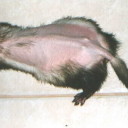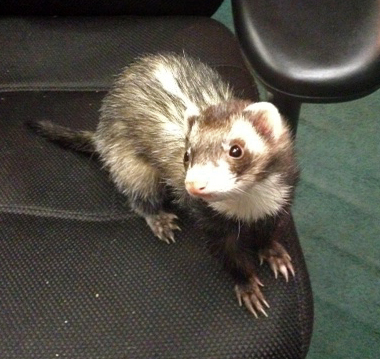- Hair loss
- Locations can be: rump, base of tail, top of head, belly, front of legs, top of feet, sides, along the back bone, shoulders, patches here and there … or any combination thereof.
- “Rat tail” can be plugged pores (solved by weekly tail baths) or it can be from adrenal disease (which causes increased oil production). Rat tail that goes away and comes back again (especially in the spring) usually turns out to be adrenal disease.
- Fur that goes away and comes back again usually goes away and stays away next spring. If your ferret was bald and is no longer bald (and you’ve been feeding good food), almost certainly your ferret has adrenal disease.
- Fur loss from malnutrition, scratching from flea allergy or ear mites, ring worm and other medical causes usually starts to grow back within days after treatment. Bald patches that don’t grow back within a couple weeks are suspicious for adrenal disease.
- Fur that pulls out easily leaving bald pink skin behind is almost always adrenal disease, especially if there is dandruff underneath
- Generally thin fur. If the ferret has thin fur all over, that is suspicious. If you can see pink through the fur on the shoulders, that is also very suspicious. If the fur seems shorter on the shoulders, that can also be a sign of adrenal disease.
- Dandruff and/or oily (orange/red) patches
- Adrenal disease increases oil production, leading to oil deposits, black heads on tail and sometimes on the back
- Extra oil sometimes leads to dandruff. Dandruff is sometimes dramatic. Even if your ferret seems to shed normally (with young fur growing out), if it has dandruff I would be suspicious of adrenal disease.
- Nasty fur
- Dry, brittle, stiff fur can be from malnutrition but if correcting the diet doesn’t make a change in a month, it’s most likely adrenal disease.
- Fur sometimes will feel oily
- Smell
- Adrenal ferrets often smell strong. It is similar to what a “whole” ferret smells like, but it has an acrid, sickly smell to it.
- Teat swelling
- Both males and females will get swollen teats. If you have a male with teats showing through the fur, or the teats are pronounced, it’s almost always adrenal disease.
- Skin issues
- Itchiness, sometimes extreme
- Oily patches
- Dandruff
- Scabs (usually from scratching)
- Vulva swelling in females
- Females will sometimes (but not always) have a swollen vulva as if she were in season. Some vulvas are naturally a little raised, but an adrenal vulva can get huge.
- It’s good to know what your female’s vulva looks like normally so you can tell if it’s bigger than usual.
- If they have been adrenal a long time, the vulva can have a discharge and sometimes will become infected. Any kind of discharge from the vulva is reason to take the ferret to the vet.
- Changes in bloodwork
- Anemia: Long term adrenal disease causes bone marrow suppression, which will cause anemia and eventually the bone will lose the ability to make new blood cells.
- Liver function: Adrenal disease can also cause abnormal liver function. The liver controls (among other things) the release of glucose into the blood. Sometimes a ferret will show signs of insulinoma (tumors on the pancreas causing too much insulin to be released and thereby causing low blood sugar) when it is really liver disease.
- Insulinoma: Adrenal disease does seem to come along with insulinoma in a lot of ferrets. Usually if you treat the adrenal disease the problems with low blood sugar get a bit better. Once in a while it will get worse. This is why bloodwork is important, along with monitoring the BG (blood glucose) using a glucometer.
- Electrolyte imbalance. The adrenal gland controls electrolyte balance (which keeps the heart beating, among other things).
- Urinary-Severe danger
- Males are prone to prostate enlargement, which presses on the urethra (and other things) making it difficult and sometimes impossible for a ferret to pee. If a ferret becomes completely blocked, this is an urgent medical emergency and must be handled within hours of discovery. Ferrets who have been blocked more than 24 hours usually don’t make it due to kidney damage and problems with abnormal bloodwork, making surgery much more risky.
- Early signs of urinary issues can be:
- Getting in and out of the litter pan repeatedly
- Acting like they can’t decide where to potty, going to many different litter pans and/or corners
- Dribbling urine across the floor – leaving a trail of dribbles
- Sometimes rubbing their penis on objects (also a sign of urinary infection or other bladder issues)
- Urinary tract infections
- Blood in the urine
- Acting tired or not feeling well
- Dehydration (don’t want to drink because peeing hurts or is hard)
- Acting constipated (people often mistake a bladder blockage for constipation)
- Straining to go, sometimes with whimpering, squeaking, whining or moaning. Usually a very bad sign.
- Bowel issues-Severe danger
- Sometimes the prostate will press on the intestine, causing thin poop. Always pay attention if you see thin poop as it could also be sign of a partial intestinal blockage.
- Sometimes it gets bad enough that the ferret has a lot of trouble pooping.
- Behavior
- Aggression: a ferret that never bit before becomes nippy or fights with his cage mates
- Sexual behavior: There is NO OTHER REASON than adrenal disease for a ferret to show mating behavior, humping toys, marking behavior (peeing on or rubbing underneath on objects), etc.
- Excessive grooming of cagemates: Sudden excessive grooming is often a sign of adrenal disease.
- Hoarding small stuffed toys, especially if they chase other ferrets away. This is nesting behavior. Males or females can show this. It all depends on where in the adrenal gland the tumors are growing. If a ferret has always done this, it’s not so much of an indicator, but if it comes on suddenly (or you see it in a male), that is suspicious.
- Grabbing the scruff and holding on is sexual mating behavior. Climbing on top of other ferrets and holding onto the scruff is, too.
- Sudden onset of ear sucking or other behavior that annoys cage mates can also be a sign.
- Acting “super charged.” Adrenal ferrets often have a higher body temperature and are incredibly active (leading people to say, “Oh, she feels just fine.”) This can cause weight loss. Weight loss is always something to investigate because it can be anything from cancer to a hairball to adrenal disease and many things in between.

















